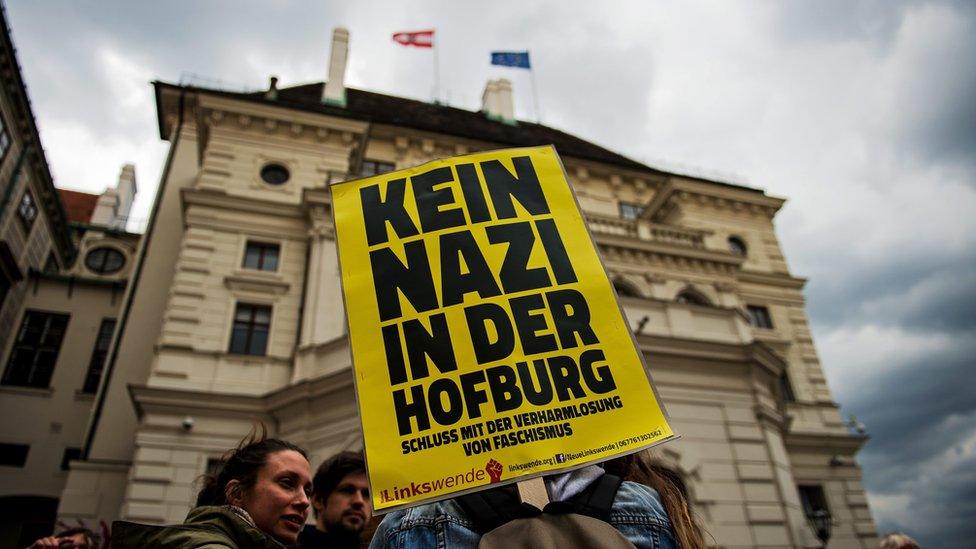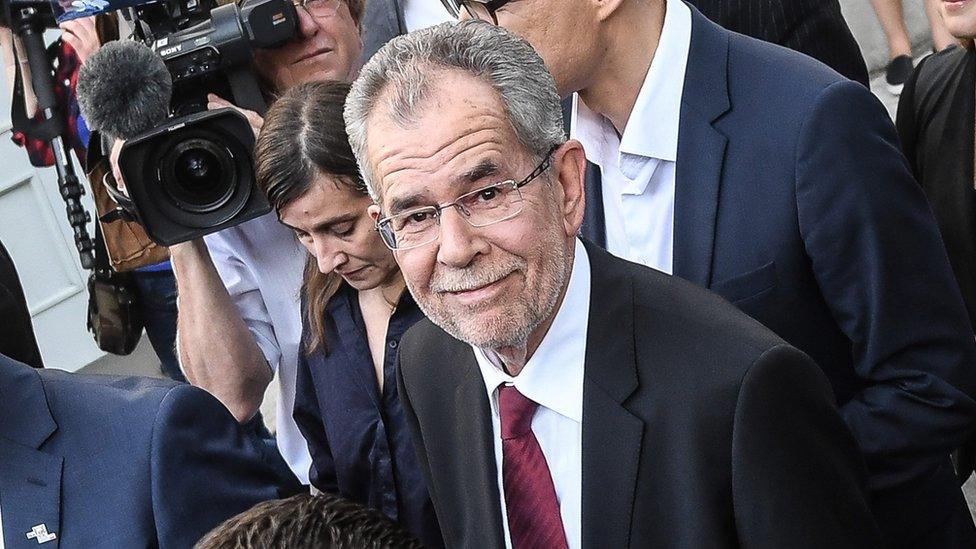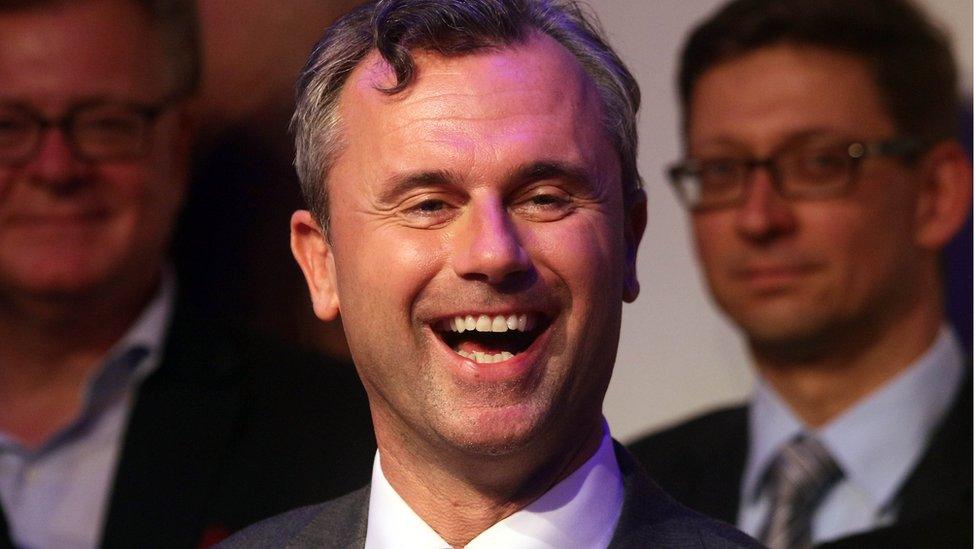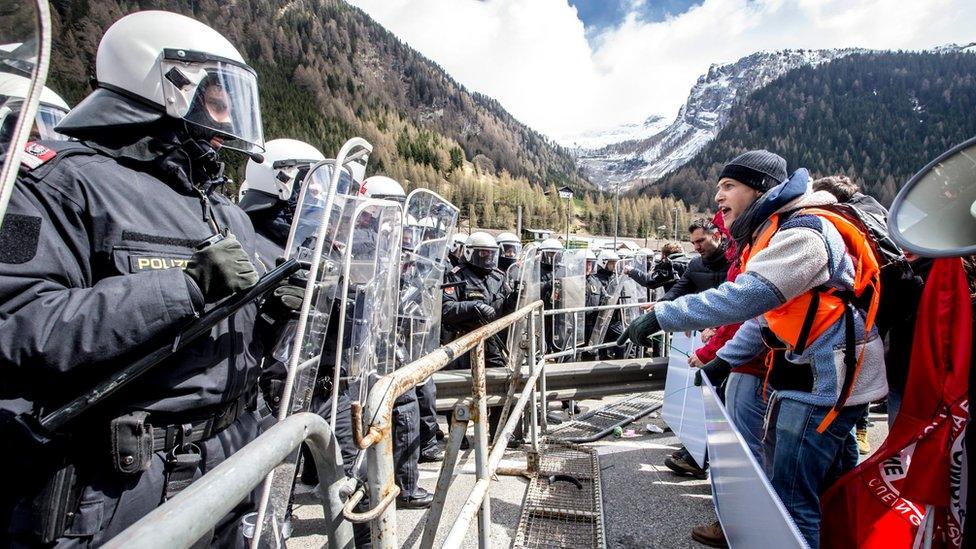Austria digests presidential poll drama
- Published

A protester holds a sign reading "No Nazis in Hofburg palace" - but many voters no longer associate populist right-wing parties with Nazi ideology
Austrians are now digesting the drama surrounding the election of their new president.
An extremely divisive race.
The traditional centre-left and centre-right parties - which have governed Austria in one form or another since 1945 - were decimated during the first round.
And the poll nearly, so very nearly resulted in a head of state from a right-wing populist party.
The rest of Europe watched and gawped.
Is Europe lurching to the far right?
Europe's nationalist surge, country by country
Could this be a portentous sign of things to come elsewhere in Europe - Italy, France or Denmark for example, where right-wing populists are gaining in strength and influence?
'Far right' too black and white?
Was this Austria returning to its "far-right" past?

Green Party-backed independent Alexander Van der Bellen defeated Mr Hofer by just a few thousand votes
Joerg Haider, who led Austria's Freedom Party until 2005, was well-known for his Nazi-praising comments.
In the end, the prospect of a Freedom Party president disturbed (just) enough Austrians to induce them to vote for the Green-Party-backed Independent candidate.
But are the now-defeated presidential hopeful, Norbert Hofer, and his Freedom Party actually 'far right'?
Not even Austrians can agree, never mind the international media covering this story.

To what extent is the "far-right" label justified for Mr Hofer?
Former Austrian vice chancellor Hannes Androsch told me it was a nonsensical over-simplification - "far too black and white".
The Freedom Party has a far-right core that doesn't reflect the opinions of all its members, he told me, and, he insisted, is not at all representative of all its voters.
"They come to the Freedom Party out of protest. For a number of different reasons."
One large one is migration: Austria is struggling to integrate the tens of thousands of asylum seekers who moved here last year.
'Austrian boat is full'
Officials say their country took in more refugees per capita than any other EU nation.
Public resentments have been heightened by rising unemployment.
"The Austrian boat is full," one Hofer voter told me. "We're a small country. We can't be like [German Chancellor Angela] Merkel, saying: 'Come in, come in!'
"We have our own poor, Austrian poor, who need help."

There have been clashes over Austria's plan to reintroduce controls on its border with Italy
"Austria First" is the Freedom Party slogan. They describe themselves as a party of the centre, of the Austrian people, neither right nor left wing.
That's something Marine Le Pen of France likes to say about her National Front party too.
And like the French National Front, the Freedom Party has invested in a makeover in order to appeal to discontented mainstream voters.
Despite failing to make it to the presidential palace, it will interpret this vote as a huge success.
Once relegated to the far-right fringes, the Freedom Party is now deemed politically viable by half of all Austrian voters.
"This is far more a European problem than an Austrian problem, Austrian diplomat Wolfgang Petritsch told me. "These parties have managed to make it OK, normal to vote for them. It's not a big deal anymore. And that is what is so dangerous."
The Freedom Party is now looking ahead to Austria's general election.
It is currently polling as the country's most popular party.
Conceding defeat today, Mr Hofer said his party would live to fight another day.
"Of course I am saddened," he said on Facebook. "But please don't be disheartened. The effort in this election campaign is not wasted. It is an investment for the future."
But Hannes Androsch is dismissive.
"Yes, they've made it to the mainstream as a party of protest," he told me "But building up Austria to be a fairytale castle that needs to be defended is no plan for the future.
"This is a wake-up call for the traditional parties in Austria - and in Europe as a whole - to address their voters' concerns.
"But the window of opportunity to do this is a narrow one."
